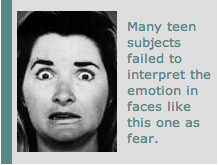 My client Jose told me that he is sure his science teacher doesn’t like him:
My client Jose told me that he is sure his science teacher doesn’t like him:
“I was asking so many questions in class, and my teacher was getting really annoyed. His breath changed and his face looked tense.”
I highly doubt that Jose’s teacher doesn’t like him, but it’s clear that Jose feels as if there is a disconnect with his teacher. And that feeling of disconnection deserves to be honored and addressed.
(Side note: Did you know that the teenage brain has trouble reading emotional body language in other people? For example, this study shows that teens often misinterpret “fear” as “anger.” Perhaps this is one reason why so many of my teenage clients complain that the adults in their lives are “angry” at them.)
Thus began a discussion between Jose and I about how he might communicate his concerns to his teacher. At first Jose was shocked: “I can’t just ask my teacher if he likes me!!” But the more we talked, the more he realized that it’s possible to communicate directly about his experiences and needs.
Ultimately, he wrote the following email to his teacher:
Dear Mr. D. I feel like I should tell you ahead of time that in science class I often have a million questions, and I don’t want to disturb the class, but if I try to hold it in I’m afraid my head will explode (I’m planning to become an astrophysicist when I grow up, so I am always curious about these things). Can you please tell me what your preferences would be if I have these questions? You can respond by email, or I could talk to you in person.”
I’m so proud of Jose for his heartfelt, honest self-advocacy. His teacher ended up following up with him in person, telling Jose that he is not at all bothered by his questions, as long as they are related to science. Jose feels closer to his teacher, and now is convinced that his teacher doesn’t hate him — and in fact, actually LIKES him! Go figure.

This is GREAT way to handle these kinds of feelings – because sometimes, if the feelings go on too long, they become self fulfilling prophecies! I love how Jose phrased his question… very productive!